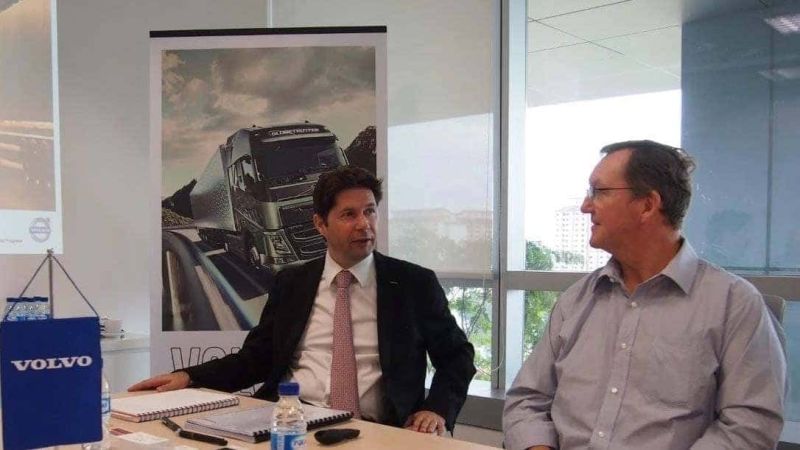Volvo Trucks in Asia Oceania: Strategy driven by customers' needs

In an exclusive media briefing, Mr. Christophe Martin, President of Volvo Group Trucks Asia Oceania Sales, shares with us the insights gathered from surveys and plans for the near future. Customers can look forward to an even closer relationship with the Volvo Group and improved services are the cornerstones for the projected growth. To begin the update, Martin welcomes guests to the new Volvo Asia Oceania office in The Metropolis, Tower 2, Singapore. During the session we also met with Mr Ian Sinclair, who had some stories to tell about the driving skills of a certain Mr Floyd Cowan.
Strategic location
Martin opened with an explanation as to why the Volvo Asia Oceania office has been set up in Singapore. He said that "Beijing was far from certain key markets such as Australia, which became part of the organization in 2013. From here, we can easily cover the entire region and the country is a great hub to reach the neighboring countries. Also, Singapore is a service oriented society. As a headquarters, this is good for us. In addition, Singapore also offers top talent that is readily available. For example, we are now getting hundreds of applications for jobs we post whereas in Beijing it was more complex.” From Singapore, Volvo manages some 24 countries with seven hubs. The service network in Thailand is a special one as it is owned 90% by Volvo. The group is planning to open rep offices in several countries, such as Myanmar and Mongolia. Without naming them, Martin also said that there are other locations that the company is considering for a bigger stake in the market.
Multibrand but same experience
Asked what is the reason behind the multi-brand workshops and dealerships, Martin explains that "What is important is to be in control of the brand experience. Surely, multi-brand dealerships and workshops are a compromise. However, at the end of the day, it is about profitability. And let's face it, if we were to have separate workshops, our clients would have to bear the additional cost for maintaining these." As each brand addresses needs catering to very specific target groups, there is hardly any overlap in the product portfolios.
Ambitious goals in Asia Oceania
Martin is confident that the market(s) in Asia will grow. "Not in double-digit rates, maybe with limited percentage, but they will grow. And we will be ready for this growth," he opens this segment of the session. Volvo Trucks’ strategies clearly pay out as the company is ranked number one in almost all countries. The segment that Volvo is monitoring is the European brands and here the aim is to become and maintain the number one position in sales of European trucks. Currently, Volvo Trucks holds a market share of 31.0% or 6500 units (2013) which is up from 24.0 %, 5000 units (2011). Volvo takes a very clear position, wanting to be the price leader. Satisfaction surveys also rank Volvo very high.
Helping clients with their business.
When assessing the needs of the markets, Volvo puts the client / user at the centre. Martin explains the way forward by bringing up a slide that depicts the six key areas the company will focus on in the short term. He describes this in detail, "These focus areas are the ones that are overall the most important. Naturally, some are less vital in some markets or segments than others, but these are the things we need to look into." While "Safety", "Uptime", "Fuel Efficiency" and "Productivity" seem to be obvious, the others are probably a little surprising. The second set of focus areas includes "Security" and "Driver Appeal".
About Christophe Martin
He started with Volvo in 1993. The time he has been with the company coincides with the number of years he has been married. Three kids call him Dad and he has lived and worked in Europe, Africa and Asia. He held various management positions such as Sales & Marketing Deputy Director, Director and Vice-President. His academic profile is rounded up by a degree from Lycee Ampere and an MBA from Ecole de Management de Lyon. He admits that he likes Renault trucks, which is not surprising, since he is a Frenchman.